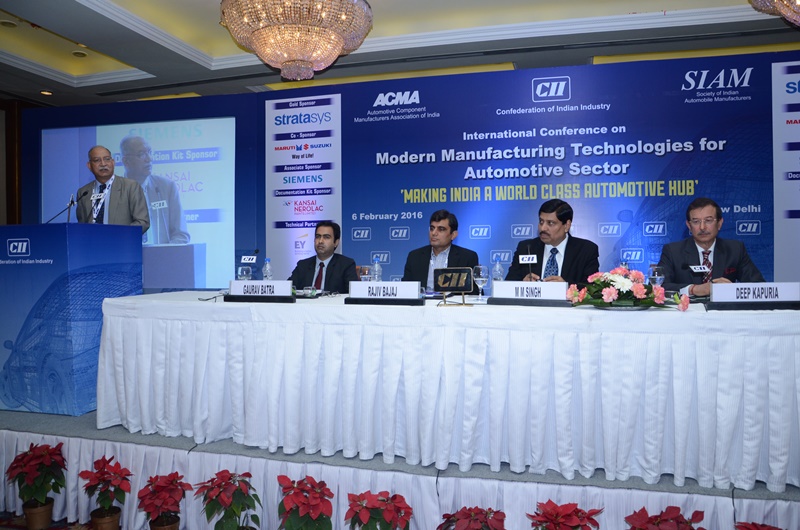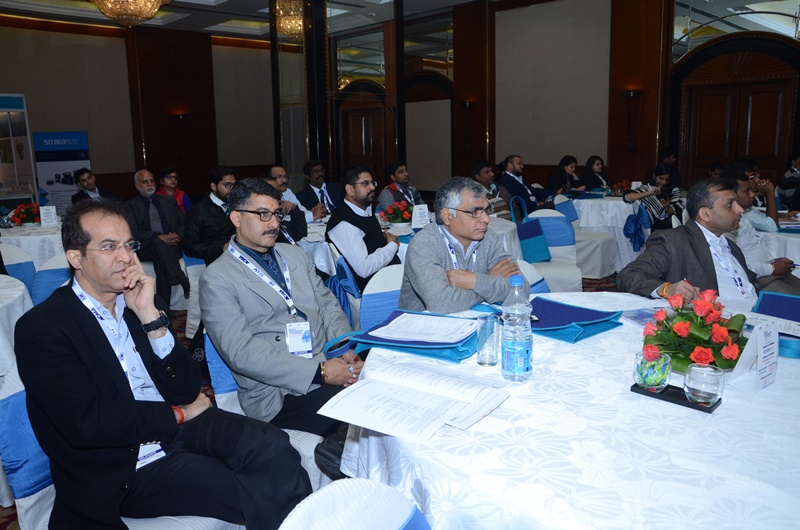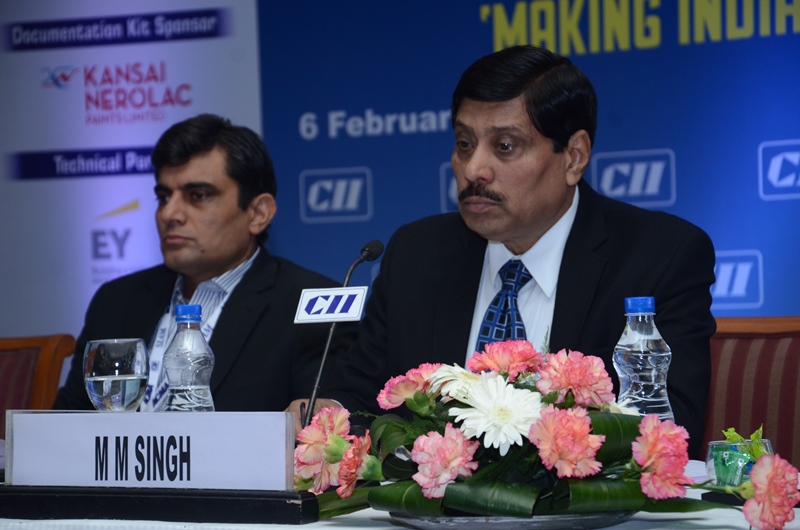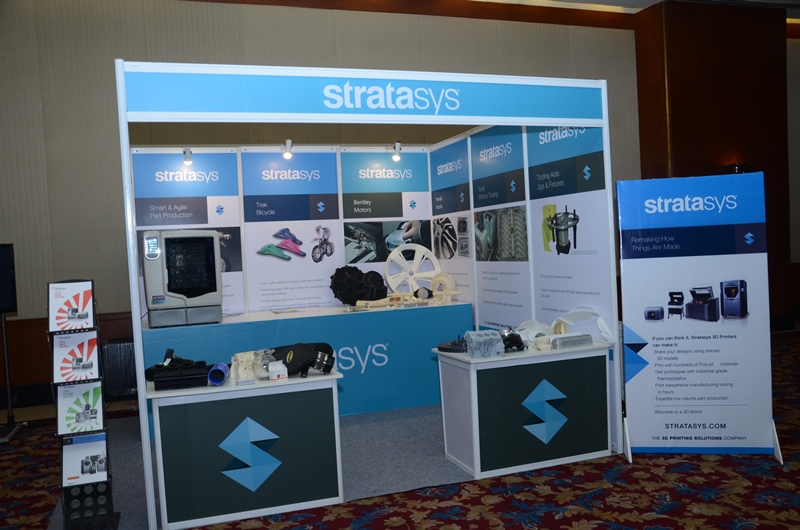Confederation of Indian Industry (CII) had recently organized an International Conference on Modern Manufacturing Technologies for Automotive Sector in New Delhi. The daylong event, which coincided with the Auto Expo 2016, was attended by the world’s leading vehicle and component manufacturers along with technology and solution providers; equipments and machinery manufacturers; research & development institutes etc. to share their insights on different facets of recent technological advancements in the automobile industry with the aim to earmark the domestic industry more robust, cost effective and globally competitive.
The primary objective of the conference was to brainstorm on the the most recent innovations, trends, and concerns, practical challenges encountered and the solutions adopted in the field of automotive manufacturing. Some of the topics addressed by the stalwarts of the Industry were ‘Advancements in Robotics & Automation’, ‘Green Factory Cost Competitiveness while improving Quality & Productivity’, ‘Zero Defect Manufacturing’, ‘Global Trends in Auto Manufacturing’, ‘Manufacturing Systems & Strategies’, ‘Augmenting Technology with Innovation : Key Drivers for Growth Breakthrough Results in Breakthrough Time’. The CII conference provided a relevant platform for the complete automotive industry from OEMs to component manufacturers and technology providers to discuss the latest and most relevant technology which will go a long way in making India a world class automotive hub.
Mr. Singh, Conference chairman and Executive Advisor of Maruti Suzuki India Ltd., stated, “Technology is critical in making available unique global designing of products linked with the needs of the customers. For this it is also important to have suppliers who are well–equipped in technology. Economic growth is possible through upgrade of the manufacturing sector. Furthermore, the auto industry should look into either reinventing the existing competitive landscape or creating fundamentally new space to thrive in the market.”
Delivering the theme presentation Mr. Gaurav Batra, Associate Director, EY listed the five key enablers that are essential for India to emerge as an automotive manufacturing hub. They are: 1) Enabling Regulatory Environment, 2) Developing Talent and Skills, 3) Fast Tracking Infrastructure Development, 4) Incubating R&D and Innovation and 5) Enhancing Supply Chain Competitiveness. He stated, “India has emerged as an important automotive market and offers huge growth potential due to very low penetration of vehicles and emerging middle class.”
CII – EY Knowledge Report on Making India a World Class Automotive Manufacturing Hub was also released on the occasion.
In his presentation on ‘Disrupting the Manufacturing Process’, Mr. Rajiv Bajaj General Manager, Stratasys India said, “Automotive is one of the core industries for ‘Make In India’ and it makes it imperative for this industry to adopt the latest in manufacturing technologies like ‘Additive Manufacturing’ to compete in the global market.”
In his address Mr. Deep Kapuria Past Chairman, CII NR and Chairman, Trade Fair Council, CII & Chairman, Hi Tech Group, highlighted the role of government initiatives and regulations for the growth of Indian automotive industry. “Focus on addressing concerns around pollution, congestion and safety as well as steps under ‘Make in India’, Skill India, besides measures to improve ease of doing business aim to transform India into a manufacturing and technology hub,” stated Mr. Kapuria.
The inaugural session was followed by the technical session on ‘Emerging Mobility Scenario: Implications for the Automotive Industry where deliberations were held on the future of mobility while driving the industry towards connected, shared, autonomous and green vehicles. The theme covered in the session included rising share of in-vehicle electronics, growing penetration of alternate powertrains and the gradual move towards connected and autonomous cars and its implications on the automotive industry, rising competition from non-automotive players (technology, telecom players, etc.) and implications of mobility service providers such as cab aggregators on the automotive industry.
Mr. Sudarshan Sarma, Head of Automotive Industry, Google spoke on ‘A Glimpse at the digital future’ highlighted exciting futuristic innovations by Google such as producing self-driven car. He said to cater to the changing needs of the customers who are technology driven, manufacturers must produce equip cars with connectivity features to make cars of the future.
Mr Debashis Mukherjee Director, Corporate Technology Group Harman India elaborated on the subject of Cyber-security for Connected Cars. He drew attention to the hazard of security breach in cars fitted with security features. He said making cars cyber safe is a critical area that the industry needs to research to save customers. Alongside demand for cyber connectivity of cars, keeping cars safe from hackers is vital.
‘Emerging Trends in the Manufacturing and Supply Chain of the Automotive Industry’ formed the theme of the following session. Latest trends and emerging technologies in the automotive manufacturing and supply chain management was discussed in this session. The themes covered included innovation in materials and manufacturing process for vehicle light weighting, new manufacturing technologies such as 3D printing, shift towards flexible manufacturing to cater demand volatility, increase in OEM platform consolidation targets and its impact on component suppliers.
Session Chairman, Dr. Chandan Chowdhury, Managing Director Dassault Systemes India Pvt Ltd made a presentation on ‘Manufacturing in the age of Experience’. Mr. Gautam Datta Senior Director – Marketing Siemens Industry Software India spoke on Vehicle light weighting: Emerging technologies and challenges. Flexible manufacturing: The way to go in the Indian auto market was the theme of the presentation by Mr. Vikram Kasbekar Senior Vice President, Head of Operations and Supply Chain Hero MotoCorp said technology was cutting into waste in the automotive industry and digitization is making it faster.
This was followed by an open interaction among the participants of the session.
A panel discussion on ‘Making India a World Class Automotive Manufacturing, Product development and Human Resource Hub’ was also held. Discussing what it takes for the country to become world class manufacturing and R&D hub, the deliberations covered all aspects around the efforts undertaken by OEMS and suppliers to build globally cost-competitive manufacturing facilities. How technically skilled manpower is getting unlocked as automakers scale R&D investments in the country and undertake global product development also formed part of the discussion. The support that the industry would desire from the government around regulations and policy formation and the mechanisms that are needed to develop manpower to be in sync with emerging manufacturing technologies and evolving vehicle retail and service landscape was also discussed.
Auto Industry – Challenges for Manufacturing, Future Trends & Technologies was the theme of the presentation by Mr Colin MacDonald, Managing Director – Manufacturing Renault Nissan Automotive India Private Ltd. Likewise, the role of efficient supply chain in India’s quest to become a global automotive manufacturing hub formed the theme of the presentation by Mr. F. R. Singhvi, Joint Managing Director, Sansera Engineering Pvt Ltd. Developing skill-sets of our workforce and harmonious industrial relations for delivering manufacturing excellence was discussed by Ms. Pooja Bhandari, Director Ernst and Young, in her presentation.



